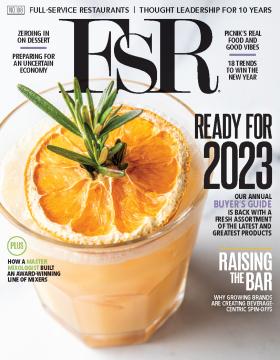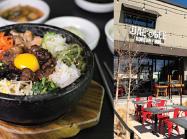Restaurants can leverage the power of AI to improve their operations, meet their ESG commitments, and provide better dining experiences for their customers.
Artificial intelligence in the food industry is helping restaurants enhance their supply chains, improve transparency, reduce foodborne illness risks, boost sustainability, and be more accountable to their customers. While there are some challenges around AI, there are also tremendous benefits for the restaurant industry to leverage.
For instance, AI has become instrumental in improving the following aspects of restaurant operations:
Supply chain optimization. One of the primary benefits of incorporating AI in the restaurant industry is optimizing the supply chain. AI can help restaurants do things like determine the optimal amount of inventory to keep in stock and the most efficient routes for delivery drivers. By optimizing the supply chain, restaurants can reduce waste and cut down on expenses, which ultimately saves them money and improves their bottom line.
Transparency and accountability. AI can also help restaurants be more transparent and accountable to their customers. With AI technology, restaurants can create an indisputable ledger of their supply chain, allowing consumers to track the journey of their food from farm to table. This level of transparency can help build trust between consumers and restaurants and ensure that restaurants meet their ethical and sustainable commitments.
Validation and verification. AI-based systems can validate supplier sources and verify that suppliers are following all the correct safety protocols. AI algorithms are able to analyze data from various sources, such as FDA inspections, supplier data, and public records, to validate and verify suppliers’ claims and maintain a high level of trust throughout the supply chain. This validation and verification is possible with affordable, reliable software that is currently available. But be aware that AI is only as effective as the data it is trained on. If the data is inaccurate or biased, AI will produce inaccurate results. Therefore, restaurants must be certain they’re collecting high-quality data and regularly auditing their AI applications to ensure that their AI is producing accurate results.
Trust and consumer confidence. Building consumer trust is an essential effort. The CDC estimates that 48 million people get sick, 128,000 are hospitalized, and 3,000 die from foodborne diseases in the US each year. As consumers continue to read frightening headlines about food recalls, foodborne illness incidents, and other food safety breaches, they're demanding transparency. The food industry should, therefore, leverage the potential applications of AI in food safety to ensure that consumers can have greater confidence that the food they consume is safe. Understand that some consumers may be wary of AI, so clearly communicate your use of AI and highlight the benefits of this technology for both the consumer and the restaurant.
ESG commitments. AI can play a significant role in dramatically boosting sustainability efforts for restaurants and their supply chains. Restaurants can reduce their environmental impact by optimizing supply chains to reduce waste and greenhouse gas emissions. For instance, AI-based systems can monitor restaurants’ inventory levels in real time, alerting managers when stock levels are running low or when certain ingredients are nearing expiration, ensuring that products are used before they spoil. AI can also optimize delivery routes, thus reducing transportation-related emissions. Additionally, AI can help restaurants uphold ESG commitments by ensuring their suppliers meet ethical standards through regular supply chain monitoring, audits, and assessments.
Risk reduction. Other helpful AI applications are predictive modeling and food quality control to help mitigate the risks of food safety breaches. One of the most prominent applications of AI in the food service industry is predictive modeling. AI algorithms can predict potential foodborne illness outbreaks by using data gathered from various sources, such as environmental factors, ingredient quality, processing operations, and historical records of contamination. This information can be used to help prevent future food safety breaches from happening. Additionally, AI algorithms can boost food quality control by analyzing images of food and packages in real-time to detect abnormalities, such as missing labels or torn packaging. This helps identify contaminated products before they reach store shelves (or consumers).
Effective communication. Today’s consumers are increasingly conscious about their food’s sourcing, safety, and quality, and want to know more about where their food came from, how it was grown or raised, and whether it’s organic or sustainably produced. They want to know if the restaurants they support are committed to ESG efforts, and if their suppliers are aligned with these values. Restaurant operators must communicate effectively, both with their suppliers and with their customers, to build trust that their ingredients are safe, high-quality, ethically sourced, sustainable, etc. AI can provide real-time data on suppliers’ sourcing practices and quality control measures, and can also help operators anticipate and prevent supply chain disruptions, such as food safety issues, ingredient shortages, or delivery delays. AI helps restaurant operators better connect—and build trust—with their customers and suppliers through enhanced transparency and communication.
AI has been transforming other industries for years, and now it’s elevating the restaurant industry, as well. AI presents significant opportunities for restaurants to optimize their supply chains, improve transparency, reduce food safety breaches, improve communication with consumers and suppliers, and be more accountable to their customers. Restaurants can leverage the power of AI to improve their operations, meet their ESG commitments, and provide better dining experiences for their customers.
Francine L. Shaw, food safety specialist, podcaster, and co-founder of My Food Source, is a successful entrepreneur, author, and speaker who spent 20+ years working in the foodservice industry. Her career has included performing services (operating partner, corporate/private trainer, health inspector, 3rd party inspector, adjunct professor) in various sectors of the foodservice industry. She has written hundreds of articles for national trade magazines and appeared on Dr. Oz, the BBC World Series Radio, and iHeart Radio as a food safety expert.

















